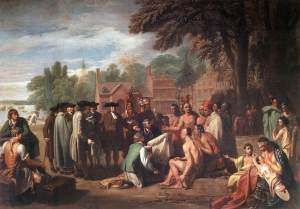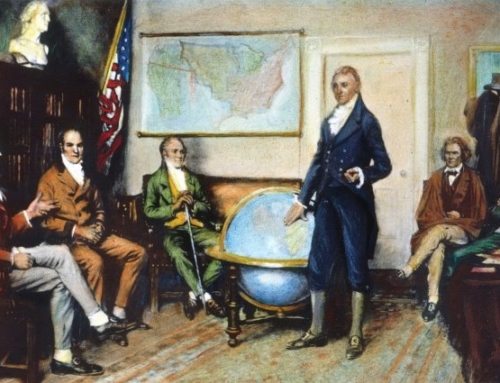 The farcical aftermath of Elizabeth Warren’s claims to have Native American blood has set me thinking about the utter madness of the world in which we live. In the first instance, what are we to think of someone who expresses elation at having a mere modicum of “native” blood? What does it say about her attitude to the 99.9% of her blood which is disappointingly European? Why is she proud of that tiny part of her which is “native,” the equivalent of her big toe, but less than enthusiastic about its purity being polluted by all that Caucasian stuff which is mixed with it? It seems odd to me, to say the least, that anyone should feel either pride or shame at the race to which they belong. It’s not as if they had anything to do with it or could do anything about it.
The farcical aftermath of Elizabeth Warren’s claims to have Native American blood has set me thinking about the utter madness of the world in which we live. In the first instance, what are we to think of someone who expresses elation at having a mere modicum of “native” blood? What does it say about her attitude to the 99.9% of her blood which is disappointingly European? Why is she proud of that tiny part of her which is “native,” the equivalent of her big toe, but less than enthusiastic about its purity being polluted by all that Caucasian stuff which is mixed with it? It seems odd to me, to say the least, that anyone should feel either pride or shame at the race to which they belong. It’s not as if they had anything to do with it or could do anything about it.
Setting such quibbles aside, the main focus of my musings has nothing to do with the racial and racist implications of the issue and more to do with the peculiar use of language, or what Orwell would call Newspeak, in the very use of the word “native” to describe the ethnic group which less enlightened generations once called “red Indians.” To be sure, the earlier label was horrible. Those who were living on the American continent when the Europeans arrived were not “Indians,” nor could they really be called “red.” Some other label was clearly needed. The problem is that the label that was chosen as a replacement is utter nonsense, in the literal sense that it makes no sense. “Native American” means one who is a native of America, which means anyone who was born here (the word native deriving from the Latin nativus, which means born). Turning to my trusty Oxford English Dictionary, we find the word native defined as “one born, or whose parents are domiciled, in a place.”
Perhaps Mrs. Warren is unaware that her other 99.9% is also native American.
Let’s get this straight, once and for all. I am an immigrant and am not, therefore, a native American. My wife, however, was born in southern California, which means that she is a native American, though her mother was born in Ireland and is, like me, an immigrant. My wife is not less of a native because her mother is an immigrant. She’s not some kind of a half-breed, who can only be considered half-American. Such a view is based upon reprehensible racist presumptions. And yet this is exactly the presumption that’s made by those who believe that only those who can trace their north American ancestry back to pre-colonial times are truly “native.” The rest of us are effectively second-class citizens in our own land. I say “our” because I am a U.S. citizen who enjoys equal rights with my native American neighbours.
The reason for our second-class status is that we are meant to carry a sense of guilt, as Europeans, for the fact that our ancestors took the land that belonged to those who were already living in north America at the time. This is, of course, a gross and grotesque distortion of reality. Most people of European descent in the United States trace their ancestors to immigrants who came to this country as economic migrants to escape poverty or persecution. Should such people carry a sense of guilt for competing with the native Americans (white, black, brown and “red”) who were already here when they arrived? If so, should Mexican immigrants who are here legally carry a sense of guilt for competing with today’s native Americans?
In addition to the above reasoning, we should ask whether a child is responsible for the sins of his parents. More pertinently within the scope of the present discussion, we should ask whether a child is responsible for the sins of his great grandparents. This is the logic of those who argue that those of European descent should feel a sense of guilt for something that their ancestors might have done. It is, in fact, worse than that. Those of European descent are actually being asked to feel guilty for something that someone else’s ancestors might have done. Speaking personally, my ancestors were all impeccably poor and working class, yet I am meant to feel guilty for what some rich blue-blooded aristocrat might have done in colonial times, at the very time that other blue-blooded aristocrats were exploiting my own ancestors. This is the fallacious logic behind the ethno-masochistic self-loathing which animates those who would seek to exclude those of European descent from the right to be “natives” in their own land.
And where does such nonsense end? My surname is probably Norman French, which means that my paternal ancestors came to England with the Norman Conquest in 1066 or in its wake. Does this mean that I am not really a “native Englishman” because my ancestors arrived in a land which was already inhabited by Anglo-Saxons?
And where does this leave those people who are descended from what were once called “red Indians” and are now called “Native Americans”? A much better name for these Americans would be aborigines, which means, from the Latin ab origine, “from the beginning.” It’s not a perfect label because the ancient descendants of these people were themselves once immigrants or invaders who replaced the earliest (or earlier?) inhabitants of this land, but it’s a much better label than the nonsensical “native” label that is currently appended to them.
When all is said and done, we are all descended from immigrants, which means that all native Americans, including those called “Native Americans,” have ancestors who were not native Americans. As a native Englishman who is the husband of a native American and the father of native American children, I don’t need a DNA test to discover or verify my true identity.
The Imaginative Conservative applies the principle of appreciation to the discussion of culture and politics—we approach dialogue with magnanimity rather than with mere civility. Will you help us remain a refreshing oasis in the increasingly contentious arena of modern discourse? Please consider donating now.
Editor’s Note: The image above is “The Treaty of Penn with the Indians” (1771-1772) by Benjamin West (1738-1820); the featured image is of Elizabeth Warren. Both images are courtesy of Wikimedia Commons.







Rather than Aborigine which in common usage seems particular to Australia why not “First Nations” reminding us that there were many.?
Canada uses “First Nations” to describe their aboriginal peoples. What about the term “indigenous”, which describes something, or in this case, someone whose ancestors were naturally from that place since before European contact, as compared to other Americans whose ancestors come from elsewhere?
Excellent article. When it comes to race, we should neither be proud nor ashamed. Also, the total story of slavery in the U.S. needs to be told. There were thousands of black slave owners, one the wealthiest slave owner in all Louisiana. Also, it was black Africans and African chieftains who captured, kidnapped and sold Africans as slaves. The original inhabitants of the Americas may also have come from Asia. It’s time for bi-racials and multi-racials to acknowledge their parents and heritage too. Those of mixed ethnicity do not choose one over the other. Neither should those of mixed race. We are who we are. In acceptance is peace.
I trust that Ms. Warren will be a more sedate Indian, or a better spokesman. Perhaps she may ride some other set of coat tails, failing that she could at least put on a more dramatic act.
What strikes me as most interesting about Warren using her fake Indian status to get her academic position is what it says about Harvard’s diversity agenda. It may have claimed to be seeking minority hires, but when the chips were down it chose someone who was about as un-Native American as can be imagined. She neither looked like one nor did she have any Indian heritage beyond doubtful family rumors.
Harvard didn’t want real diversity. It wanted someone just like them but who offered a minority checkoff.
An outstanding observation beautifully expressed, Joseph. I had the privilege of participating at Mass in St. Peter’s Basilica. Every shade of humanity was in attendance united by one faith. Our strength is not in our diversity, our strength is in our unity.
In fairness to Elizabeth Warren, however, I do believe she is a member of the Masshalloossa Nation. Let’s hope she doesn’t start sending herself smallpox blankets through the mail! Many blessings.